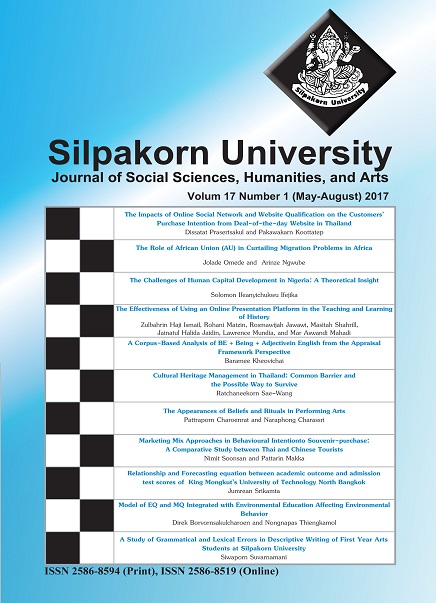The Effectiveness of Using an Online Presentation Platform in the Teaching and Learning of History
Main Article Content
Abstract
Most research on the aspects of teaching focuses on the technological, pedagogical and content knowledge. However, more studies are yet to be explored on the impact and efficiency of using technology as a tool for learning, particularly in the secondary history education. This study investigated how the online presentation platform called Prezi can be used effectively as a teaching and learning tool for the history subject. To test its effectiveness, students were given pre-test questions on historical topics before they were asked to form groups, create their own Prezi and present their products to the whole class. After the class presentation, they were given the post-test questions. The results indicated that there was an increase in the knowledge gained when the students were actually ‘doing’ and ‘creating’ their own Prezi. The findings further indicated that the students were keen to explore new technological platforms whilst studying history, thus appealing to their tech savvy tendencies. Teachers however, should carefully plan and create Prezi that are visually stimulating and grab the attention of the students in order to convey knowledge to the students.
Downloads
Article Details
All rights reserved. Apart from citations for the purposes of research, private study, or criticism and review,no part of this publication may be reproduced, stored or transmitted in any other form without prior written permission by the publisher.
References
Barton, R. (1996) A partnership approach to information technology in initial teacher training. Journal of Information Technology Teacher Education 5(3), 283-300.
Bender, C. & Bull, P. H. (2012). Using Prezi in a Middle School Science Class. In P. Resta (Ed.), Proceedings of Society for Information Technology & Teacher Education International Conference 2012.
Bernhardt, B. & Fischer, K. S.(2006) Presentations that keep your audience interested and awake. The Serials Librarian 50(3-4), 315-318.
Brock, S. & Brodahl, C. (2013) A tale of two cultures: Cross cultural comparison in learning the prezi presentation software tool in the US and Norway. Journal of Information Technology Education 12, 95-119.
Department for Education (DfE). (1995) GCSE to GFE A/AS Value Added: Briefing for Schools and Colleges. London: DfE Publications.
Elliot, J. (1991) Action research for educational change. Milton Keynes: Open University Press.
Haydn, T., Stephen, A., Arthur, J. & Hunt, M. (1997) Learning to teach history in the secondary school: A companion to school experience. London: Routledge.
Haydn, T. & Macaskill, C.(1996) Making the most of information technology in the PGCE year. London: ULIE
Kemmis, S. & McTaggart, R. (1990) The action research reader. 3rd ed., Geelong: Deakin University Press.
Kiss, G. (2016). MS power point vs prezi in Higher education. Turkish Online Journal of Educational Technology 15(3), 126-130
Leberecht, T. (2009) Power to Prezi! Retrieved July 18, 2016, from https://www.cnet.com/news/power-to-prezi/.
Leimbach, L. (2010) Prezi: Just Plain Good for Content. Retrieved July 18, 2016, from https://rsu2teachertech.wordpress.com/2010/11/09/ prezi-just-plain-good-for-content
Lightle, K. (2011) More than just the technology. Science Scope 34(9), 6-9.
Lloyd-Jones, R. & Lewis, M. (2000) Integrating information technology into the history curriculum. In A. Booth, & P. Hyland (Eds.), The Practice of University History Teaching, pp. 70-84. Manchester University Press.
Ministry of Education. (2013) The National Educations System for the 21st Century: SPN21 (Revised ed.) Bandar Seri Begawan, Brunei Darussalam: Ministry of Education.
OFSTED. (1996) The Annual Report of Her Majesty’s Chief Inspector of Schools: Standards and Quality in Education 1994/95. London: HMSO.
Perron, B. E. & Stearns, A. G. (2011). A review of a presentation technology: Prezi. Research on Social Work Practice 21(3), 376-377.
Rogers, P. J. (1978) An experimental test of a “forms of knowledge” approach to teaching. Educational Research 20(2), 130-136.
Spaeth, D. A. (1996) Computer assisted teaching and learning. In A. Booth & P. Hyland (Eds.), History in Higher Education. London: Routledge
Swanswick, R. (2009) Prezi Presentation Tool. Retrieved July 16, 2016,from https://swanthinks.wordpress.com/2009/10/19/prezi- presentation-tool/
Watrall, E. (2009) Challenging the Presentation Paradigm: Prezi. The Chronicle of Higher Education. Retrieved July 14, 2016, from https://chronicle.com/blogs/profhacker/challenging-the-presentation-paradigm-prezi/22646
White, N. L. (2011) Prezi V. PowerPoint: Finding the Right Tool for the Job.Unpublished Master Thesis. Utica, NY: State University of New York Institute of Technology.


